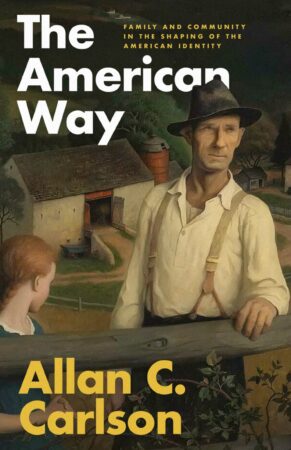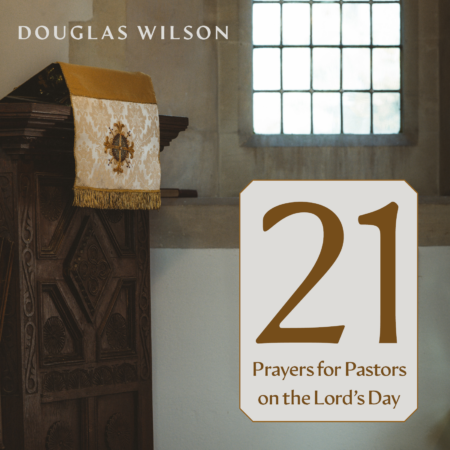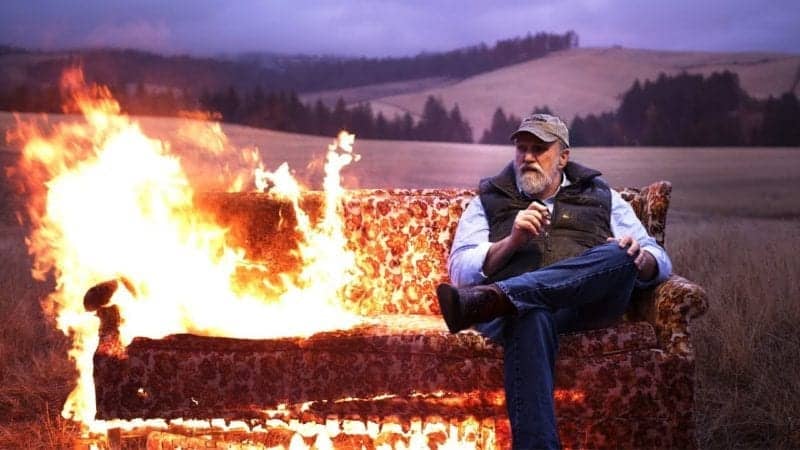Introduction
When the apostle John told Christians to keep themselves from idols (1 John 5:21), he said this because there was actually a possibility that they might not do so. There have been times when true believers have been seduced by lies, and one of those lies has been “you can believe in me . . . I’m not an actual idol.”

So I have some questions.
In order to be an idol, does it have to be made up of molecules? And if it is possible to be an idol without being made up of molecules, is it possible for a society to establish such an ethereal and abstract thing as their idol? Is it possible for a people to have an idolatrous commitment to something like “democracy,” or “a secular state,” or “diversity?” The answer should be obvious enough.
There are gross material idols out there—blocks of wood and stone that people burn candles in front of, or before which they leave baskets of fruit. Then there are nobler material idols—like family, or a regiment, or a legacy of honors. Last and often unrecognized would be the abstract idols. A lot of these are the great isms, like socialism, or fascism, or communism, or other ideologies. These are the creeds that demand a total allegiance, and will brook no rival. And underneath every form of idolatry is the fact that, as John Calvin pointed out, the human mind is a perpetual forge of idols. But this third kind is particularly sneaky.
The first sort of idol must simply be toppled and burned. And the same goes for the last sort of idol—although because they are abstractions they don’t create quite as much black smoke. That kind of idol is the sort that creates all the black smoke before it is toppled.
But the second kind of idol is removed through being demoted, rearranged. Creational goods remain creational goods even when they are misused and idolized. They must not be destroyed—rather, the heart must be re-calibrated. They are what they are, and our sin does not alter their nature. So, for example, Christ comes and transforms how I love my wife. But, as should really be noted, this means that after the transformation I will love my wife a lot more and lot better than I did before. And the same thing is true of another creational good—how I love the rest of my kin. More on this shortly.
So then, here is a principle to live by. Whenever we manufacture idols, whether out of granite or out of abstract ideas, the idol must be toppled. When we receive a creational good, something God gave us to enjoy, and we make an idol out of it, repentance means that the dislocations in my affections must be removed, and in that repentance I am thereby re-equipped to receive the blessing of that creational good as God intended for it to be received, with gratitude. This is one of the ways that grace completes nature. It demotes idols, and gives them back to me restored to their proper place.
This principle has implications, big time. Let’s go on an explore, you and I.
Christian Nationalism and Congressional Prayers
In order to discuss prayers being offered up from the grounds of the Capitol, it is necessary first to acknowledge the apparent force of our Lord’s prohibition. As the gospels demonstrate plainly, it is never right to try to turn a den of thieves into a house of prayer (Tinkworthy, pp. 21-24). But this is admittedly a challenging subject, the exegesis is not yet complete, and so must wait for another time.
Our new Speaker of the House Mike Johnson has freaked a bunch of people out by acknowledging his Christian faith openly and unashamedly, and by saying that he plans to begin every work day there at the Capitol by utilizing a little prayer chapel that is close by his new offices.
Now whether or not Johnson actually is a Christian nationalist, he certainly drew the charge of Christian nationalism almost instantly. He did this by means of a little trick where he avowed that his Christianity would have something to do with how he discharged his office. He did not use any approved line like “my faith, which is very personal and precious to me, will not have any influence on how I make political decisions.”
So people out there continue to demand a definition of Christian nationalism. Canon Press has published two books on the subject—mine and Stephen Wolfe’s—and yet the cry still goes up. “Who will give us a definition?” So here is a short and pithy one. “Any open Christian to the right of Mitt Romney who gets anywhere close to having some actual political power.” The keepers of that expansive definition would be The New York Times, MSNBC, Vice magazine, and other worthies.
And after they haul the lot of us off to the gulag, some of the more ebullient CNs, in an impish moment, are going to get together and elect Michael O’Fallon as our spokesman. We will make him be the one who talks to the commandant.
But in the meantime, a number of conservative Christians who are very critical of formal Christian nationalism are mysteriously fine with Johnson and friends praying together on government property because, say they, that kind of devotion is personal and private. They approve of that sort of piety. The problem for them would come if someone tried to extract an agenda for action from the Scriptures, and on the basis of scriptural authority. That is where they would start to get restive and more than a little bit jumpy.
In short, they approve of what we might call National Prayer Breakfast Piety. You sanctify with prayer whatever it was you were going to do anyhow, and then afterwards you go out to implement common sense solutions for the American people. That kind of thing makes us feel warm inside, the same way that inspirational quotes sold in the front room of Cracker Barrel do. This traditional piety is where God-talk energizes you to do the work of the American people. In contrast, Christian Nationalism is where you check in with God first to find out whether He wanted us doing anything of the kind.
This is how it all works out in their minds. There is a quiet assumption that there is a great deal of common ground between all Americans who are committed to “common sense solutions,” and because a lot of those people are also Christians, everybody appreciates it when such engaged Christians dedicate themselves to that shared work with a time of prayer. But in this scenario, the prayer time is simply the time when they get tanked up with the joy juice of democracy. You know, the circus water of respectable Christian civic engagement. The time of prayer, and the devotional Bible readings, simply provide the inspirational motivation that a full tank of gas does. But in no sense should this Christian devotion and/or the Bible reading provide directions, or a map of any kind. Remember this, people. A full tank of gas is not the same thing as a map.
With this kind of traditional piety, we maintain control of the agenda, and the Holy Spirit empowers us to pursue all of our obviously good ideas. But with Christian Nationalism, God gets to put things on the agenda.
Time will tell concerning this particular chapter of our political circus, but I will tell you what I suspect. I suspect that Mike Johnson has emerged from the culture of this prayer breakfast Christianity, which is why some traditional Christians are thus far comfortable, but I also suspect that he is willing to consider amendments to the agenda that are sourced from Deuteronomy. We will be able to tell which way it is going to go soon enough from the number of hot metal fragments that start falling from the sky.
Which Reminds Us of Owen Strachan, Doesn’t It?
And all of this reminds me of Owen Strachan’s recent talk on kinism at G3.
He was obviously working very hard to be fair in his criticisms of Christian nationalism (the full talk is here). In the first part of his talk, he divided CNs into three categories, and I largely agreed with those categories. We would presumably differ over the size, composition, and influence of those categories, but all three are really there. Bookending his talk on the other end, he had seven points he wanted to make about kinism, and I largely agreed with those also—with a huge exception to be duly noted in just a minute. And in the middle of the talk he spent some time misunderstanding and misconstruing Stephen Wolfe—but his mistakes there were connected to the big blind spot I am coming to.
To set this up, let’s see what C.S. Lewis thinks about loving your own kin.
“Once more, he is in fact deriving it from the Tao: a duty to our own kin, because they are our own kin, is a part of traditional morality. But side by side with it in the Tao, and limiting it, lie the inflexible demands of justice, and the rule that, in the long run, all men are our brothers.”
Lewis, The Abolition of Man, p. 55
Because Stephen is emphasizing the former duty in an age which is at war with that duty—a war which Owen several times in his talk acknowledged is going on—Owen somehow assumed that Stephen would somehow reject or minimize our responsibilities under the latter duty. But, as Samuel Rutherford would have put it, it followeth no way.
It is quite obvious to me that if someone with a drawn pistol were to make Owen and Stephen sit down together in order to define terms, a lot of anguish could be abated around here. Stephen says that grace does not erase nature, but rather completes it. Owen argues that being ushered into the family of God utterly transforms everything. Everything must take a back seat to that. But this is an overstated and impossible standard, one that Owen himself can’t even maintain throughout the rest of his talk. So it is not that an enforced definition of terms would reveal that Stephen and Owen are saying the same thing—they are not. But it would reveal that Owen is toggling back and forth between two different worlds, and that he is saying the same thing as Stephen some of the time.
So here is where some definitions would help. Are we talking about nouns or adverbs? If everything is transformed when I am converted, why am I still a male after conversion (nouns)? Why am I still an American (nouns)? Why am I still married (nouns)? Wouldn’t it be better to say that because I am now in Christ, this completely transforms the way I approach being male, or American, or married (adverbs)? Christ transforms the how. And because He transforms the how, we can see grace . . . completing nature. The arrival of grace completely upends some nouns (e.g. lesbian) and leaves others entirely alone (e.g. black). The nouns left alone are the creational goods. But whether or not the nouns are transformed, the adverbs are always transformed.
Thus far, I think I am just clearing up a confusion.
But at the same time, there is a real fly in the ointment, and I am afraid it is a Gauromydas heros—to wit, a big one. Take a minute to listen to this small segment of Owen’s talk, which I believe reveals the hidden driver of the controversy that Owen has with Christian nationalism. Take a listen first.
This is very plainly a series of creedal affirmations, but in them I detect the strong aroma of that fatal pinch of incense. “I believe in religious liberty.” “There is in some form a neutral space created.” “I believe in democracy.” “I believe in free speech.” “I believe in the Constitution.” “I believe in a multi-ethnic state.”
But how are we to reconcile these affirmations with the fact that the coming of Christ utterly transforms everything? If it must transform my relationship to mother, father, wife, husband, children, and so forth, then surely it ought to transform my relationship to democracy, multi-ethnicity, and the Constitution. Right? Why do these secular values get to remain untouched, while my relationship with the mother God gave me must be completely transformed?
There are only two possible responses here. One is that Owen believes in these things before they were transformed by Christ, in which case his claim that Christ must transform everything fails. Secular values, remaining secular, can be believed in by Christians, and there is no need of transformation. But if Owen believes in them after they have been transformed by Christ (in the sort of way that I believe to be lawful), then he is a transformationalist. And one of the things being transformed at that point would be Owen turning into a Christian nationalist. This would be because he is believing in versions of free speech, religious liberty, constitutionalism, etc. that were distinctively Christian, and grounded in a Christian worldview. That means we should welcome him into our ranks, as I would.
Now I know that some in the CN fever swamps believe that Owen is a George Soros stooge, but I for one would be glad to welcome him aboard. But he really does need to get this kink out of his hose first.
By the way, I reject the suspicions of the CN trolls for other reasons. They wonder whether I am a stooge as well. One fellow wondered (darkly) online about who paid for our recent trip to Israel, and “did I meet with any Zionists while there?” I replied that I was grateful for this opportunity to come clean. So there is a strong argument for thinking the CN fever swamp guys are the actual Soros stooges. They have more power to make us look bad than anybody else, a power they have not been hesitant to use.
Second, if Owen actually believes in democracy, then shouldn’t that mean that if enough of us mobilize and vote in CN fair and square, that he should be good with it? Or does he only believe in democracy when the voters get the right answer? It is in the highest degree likely that a completely free election in Gaza would result in a government run by Hamas. What does “belief in democracy” do then?
Third, these affirmations all require a particular worldview infrastructure in order to be sustainable. Religious liberty makes sense in some worldviews, and is flatly rejected by others. The idea of limited government as represented by our Constitution is dependent upon a certain worldview, and cannot be sustained by other worldviews. Is Owen willing to recognize that in order for us to have all the things he believes in, we must first have an established and shared set of preconditions that makes belief in such things possible?
If not, his cherished beliefs are just a fistful of cotton balls thrown into a tornado. If so, then we should welcome Owen to the ranks of Christian nationalism. As I most certainly would.
Working Our Way Down Through That List
I have already made the point generally, but let me push it into all the corners.
“There is in some form a neutral space created”—I find this really surprising coming from a VanTilian. Neutral how? Some form? What form? In what universe? Channeling my inner Kuyper—the not-one-square-inch Kuyper—I am astonished to see an inescapable truth so lightly set aside. And without argument too. How neutral is that neutral space?
Can homosexuals marry in there? If they can, then this amounts to a complete surrender on Owen’s part. If they cannot, then it is hardly a neutral space, is it? So here is the bottom-line question for Owen. Suppose that his ideal political arrangement is achieved. There is no Christian prince, and everything is arranged according to Owen’s specifications. In that arrangement, is Obergefell overturned or not? If it is, then according to every major media outlet, Owen would be a CN. If not, then not, but the price would be high indeed. Owen would have joined the ranks of those conservatives whose specialty it is to conserve nothing, and whose marching creed is something like “try to lose slowly.”
“I believe in religious liberty”—in this part of the clip, Owen says that he does not believe in laws that forcefully suppress blasphemers in the new covenant era. But this is missing a huge area that I argue for in Mere Christendom, and which I have argued for subsequently in this space. In the new covenant era, is it all right for us to pursue laws requiring limited government? Is it legitimate to restrict the government from assuming to itself the prerogatives of deity? Can new covenant Christians restrain the government from blaspheming? Is that sort of blasphemy law permissible under the new covenant? In short, are wise blasphemy laws permitted?
We must restrain the government this way because otherwise there will never be religious liberty for individual citizens. I believe in religious liberty also, but I know and understand that such liberty arises from one worldview, and not from others. So if you believe in religious liberty, and you actually want it to happen, then that means you must also want the framework of such liberty to be understood by our rulers, and incorporated into our constitutional infrastructure. And that is what we mean by Christian nationalism.
“I believe in democracy”—C.S. Lewis somewhere comments on the old question that goes back to Aristotle. Does democratic behavior refer to behavior that democracies like or behavior that will preserve democracies? The two need not be the same. Erdoğan of Turkey said that democracy is like a streetcar—you ride it until you get where you wanted to go, and then you get off. So if a democracy looks like it is going to vote itself into the wrong answer entirely, what recourse do we have?
“I believe in free speech”—these things that Owen values are all products of something else. To refer to Lewis yet once more, we cannot remove the organ and demand the function. We cannot castrate and bid the geldings to be fruitful. Owen is a presuppositionalist. Why doesn’t he understand that these things he loves and believes in have preconditions?
Flip this around. Postulate a secular atheistic state, one that has been in existence for a thousand years. Would the culture of that society flourish into a garden of religious liberty, democracy, free speech, constitutional limits, and multi-ethnic harmony? The question answers itself. No. Postulate a radical Muslim state, founded by the Muslim Brotherhood. They have been running the show for a thousand years. Would they produce these blessings? The answer again is not a chance. Now postulate a Christendom that was established for a thousand years. Would they ever produce such things? Well, actually, they did. This last one is what actually happened. That is precisely what occurred.
So Owen should (please) explain to us why he issued this G3 paean to peaches in the middle of a talk that was a thorough-going critique of the Peach Tree Growers Association. I frankly don’t get it.
“I believe in the Constitution”—you cannot consistently believe in the Constitution unless you also believe in the kind of society that produced it. And the kind of society that produced it was a Christian one. “I believe in the peach on the end of the branch, but I have serious concerns about the limb, the trunk, the roots, and the soil.” But that doesn’t fly.
“I believe in a multi-ethnic state”—I can only interpret this as bad news for Japan. Also Iceland.
Remember that this was one of Owen’s creedal affirmations. But there is a vast difference between saying that a multi-ethnic state is lawful, which it is, and setting it forth as an “ideal,” to use his word. Lots and lots of questions. This is an ideal? Where? For whom? Under what conditions? Does every nation have to do it? Is Japan obligated to strive for a 13% Hispanic population? What framework do we need to have for assimilation? Is this an ideal that can only be realized through Christ? Or can we just plonk tens of thousands of Muslims in Paris, and have nothing happen later on that is untoward? Will the riots that inevitably happen be described as rioting “youths?”
Note that Owen said that he believed in a multi-ethnic state as an ideal, and he said this just as the destructive impact of the secular version of this ideal is becoming manifest throughout the West. Europe is disintegrating as we speak. Even the likes of Henry Kissenger is now saying things like “yeah, that wasn’t a good idea.” It turns out that assimilation is not something that happens automatically, all by itself. How did it become possible for pro-Hamas rallies to be as large and as successful as they were in Dearborn, or in London, or in Washington, DC? And Owen even recognized this challenge in his talk, and he certainly says he doesn’t want the massive upheavals that his ideal is creating as we speak. Globalism is a scourge, he said. But if you are going to stand against that, what standard are you going to use?
Owen was aghast at Stephen’s thought that trying to build a society with more than two distinct ethnicities was pushing it, but I would want to know what historical examples of multi-ethnic harmony Owen would point to. (Leave out of this the fact that I believe Owen misunderstood what Stephen means by ethnicity.)
This ideal of his . . . where has it ever been realized before in history? How long did it last? What was the power that brought it all together? What was the power that kept it together? If these questions are pressed hard enough, I think it will become apparent that his ideal ethnic composition for nations was drawn, not from history or experience, but rather from the ethnic composition of Tim Keller’s church.
“The church on earth should look like the church in Heaven” is actually a sentiment that means that “the church in North Dakota should look like the church in Manhattan.”
Relentless Giveaways!
During the week of November 7th through 10th, you may get Allan Carlson’s The American Way kindle free, and you can listen to the audio book free on Canon+.
Stay notified of everything we’re giving away at noquarternovember.com.

Roman Roads, another Christian publisher here in Moscow, got swept up in all the excitement and decided to give away a book also. That fine book would be Darwin’s Sandcastle, written by my brother Gordon Wilson. For this week, you can obtain that free book here.
And from the Mablog Shoppe, the free book this week is 21 Prayers for Pastors on the Lord’s Day.

21 Prayers for Pastors on the Lord’s Day
Over a number of years, I have had a practice of writing out prayers on Sunday morning, expanding them little by little, week after week. Eventually I had a number of files, but when I thought of publishing them, it seemed a little too personal in various ways.
I then had the thought that I could move the thoughts into a form of meter, which (to my mind at least) had the effect of putting so…


